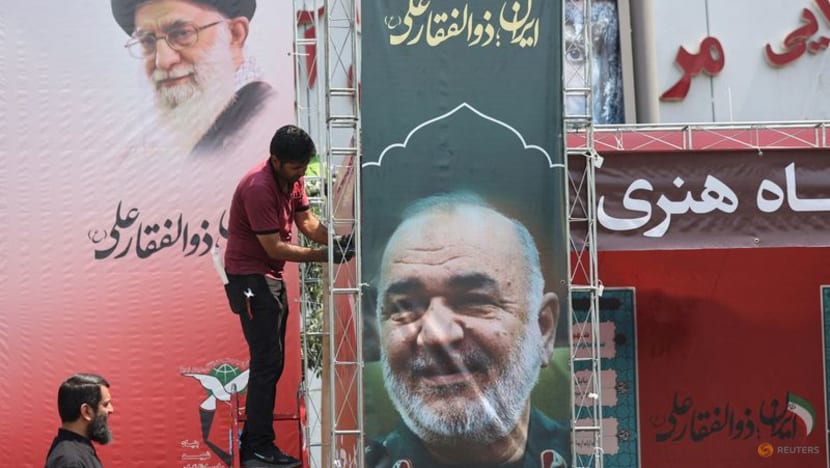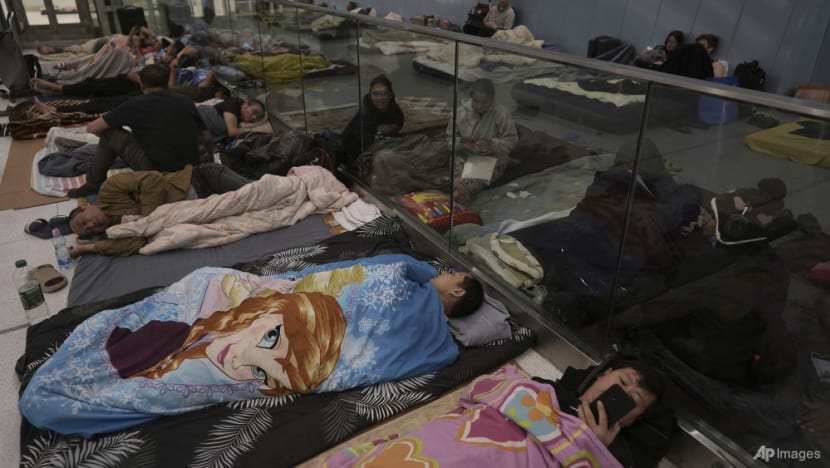Trump calls for Iran's 'unconditional surrender' as Israel-Iran air war rages on

A man installs a banner with a picture of late Islamic Revolutionary Guard Corps (IRGC) Commander-in-Chief Major General Hossein Salami, following the Israeli strikes on Iran, in Tehran, Jun 14, 2025. (Photo: WANA (West Asia News Agency) via REUTERS/Majid Asgaripour)
DUBAI/JERUSALEM: President Donald Trump called for Iran's "unconditional surrender" on Tuesday (Jun 17) and warned that US patience was wearing thin, but said there was no immediate intention to kill Iran's leader "for now", as the Israel-Iran air war raged for a fifth day.
Israeli Defence Minister Israel Katz said meanwhile that Iran's Supreme Leader Ayatollah Ali Khamenei could face the same fate as Iraqi President Saddam Hussein, who was toppled in a US-led invasion and hanged in 2006 after a trial.
"I warn the Iranian dictator against continuing to commit war crimes and fire missiles at Israeli citizens," Katz told top Israeli military officials.
Explosions were reported in Tehran and the city of Isfahan in central Iran, while Israel said Iran had fired more missiles towards it late on Tuesday, and air raid sirens sounded in Tel Aviv and southern Israel. The Israeli military said it had conducted strikes on 12 missile launch sites and storage facilities in Tehran.
Trump's comments, delivered via social media, suggested a more aggressive stance toward Iran as he weighs whether to deepen US involvement.
"We know exactly where the so-called 'Supreme Leader' is hiding," he wrote on Truth Social. "We are not going to take him out (kill!), at least not for now...Our patience is wearing thin."
Three minutes later, he posted, "Unconditional surrender!" in all capital letters.
Trump's sometimes contradictory and cryptic messaging about the conflict between close US ally Israel and longtime foe Iran has deepened the uncertainty surrounding the crisis. His public comments have ranged from military threats to diplomatic overtures, not uncommon for a president known for an often erratic approach to both domestic and foreign policy.
Trump had predicted earlier on Monday that Israel would not be easing its attacks on Iran. But he also said he might send US Middle East Envoy Steve Witkoff or Vice President JD Vance to meet Iranian officials.
Trump had said his early departure from the Group of Seven nations summit in Canada had "nothing to do" with working on a ceasefire deal between Israel and Iran, and that something "much bigger" was expected.
Vance said the decision on whether to take further action to end Iran's uranium enrichment programme, which Western powers suspect is aimed at developing a nuclear bomb, "ultimately belongs to the president". Britain's leader said there was no indication that the US was about to enter the conflict.
Trump met for 90 minutes with his National Security Council on Tuesday afternoon to discuss the conflict, a White House official said. Details were not immediately available.
The US is deploying more fighter aircraft to the Middle East and extending the deployment of other warplanes, three US officials told Reuters. The move follows other deployments that US Defense Secretary Pete Hegseth described as defensive in nature.
REGIONAL INFLUENCE WEAKENS
Khamenei's main military and security advisers have been killed by Israeli strikes, leaving major holes in his inner circle and raising the risk of strategic errors, according to five people familiar with his decision-making process.
The Israeli military said Iran's military leadership was "on the run" and that it had killed Iran's wartime chief of staff Ali Shadmani overnight, four days after he replaced another top commander killed in the strikes.

With Iranian leaders suffering their most dangerous security breach since the 1979 Islamic Revolution, the country's cyber security command banned officials from using communications devices and mobile phones, Fars news agency reported.
Israel launched a "massive cyber war" against Iran's digital infrastructure, Iranian media reported.
Ever since the Iran-backed Hamas attacked Israel on Oct 7, 2023, and triggered the Gaza war, Khamenei's regional influence has been weakening as Israel has pounded Iran's proxies, from Hamas in Gaza to Hezbollah in Lebanon, the Houthis in Yemen and militias in Iraq. And Iran's close ally, Syria's autocratic president Bashar al-Assad, has been ousted.
Israel launched its air war, its largest ever on Iran, on Friday after saying it had concluded the Islamic Republic was on the verge of developing a nuclear weapon.
Iran denies seeking nuclear weapons and has pointed to its right to nuclear technology for peaceful purposes, including enrichment, as a party to the international Non-Proliferation Treaty.
Israel, which is not a party to the NPT, is the only country in the Middle East believed to have nuclear weapons. Israel does not deny or confirm that.
Israeli Prime Minister Benjamin Netanyahu has stressed that he will not back down until Iran's nuclear development is disabled, while Trump says the Israeli assault could end if Iran agrees to strict curbs on enrichment.
Before Israel's attack began, the 35-nation board of governors of the UN nuclear watchdog, the International Atomic Energy Agency, declared Iran in breach of its non-proliferation obligations for the first time in almost 20 years.
The IAEA said on Tuesday there were indications of direct impacts on the underground enrichment halls at the Natanz facility, and that there was no change to report at the Fordow and Isfahan sites.
Israel's Katz said the Iranian nuclear installation at Fordow, where an enrichment site is dug deep into a mountain, was an issue that will "of course" be addressed.
Israel says it now has control of Iranian air space and intends to escalate the campaign in the coming days.
But Israel will struggle to deal a knock-out blow to deeply buried nuclear sites like Fordow without the US joining the attack, according to analysis echoed on Tuesday by Germany's leader.
Iran has so far fired nearly 400 ballistic missiles and hundreds of drones towards Israel, with about 35 missiles penetrating Israel's defensive shield and making impact, Israeli officials say.
Iran's Revolutionary Guards said they had hit Israel's Military Intelligence Directorate and foreign intelligence service Mossad's operational centre early on Tuesday. There was no Israeli confirmation.
Iranian officials have reported 224 deaths, mostly civilians, while Israel said 24 civilians had been killed. Residents of both countries have been evacuated or fled.
World oil markets are on high alert, following strikes on energy sites including the world's biggest gas field, South Pars, shared by Iran and Qatar.















